NC State Extension Helps Turn Swords to Plowshares
go.ncsu.edu/readext?1038059
en Español / em Português
El inglés es el idioma de control de esta página. En la medida en que haya algún conflicto entre la traducción al inglés y la traducción, el inglés prevalece.
Al hacer clic en el enlace de traducción se activa un servicio de traducción gratuito para convertir la página al español. Al igual que con cualquier traducción por Internet, la conversión no es sensible al contexto y puede que no traduzca el texto en su significado original. NC State Extension no garantiza la exactitud del texto traducido. Por favor, tenga en cuenta que algunas aplicaciones y/o servicios pueden no funcionar como se espera cuando se traducen.
Português
Inglês é o idioma de controle desta página. Na medida que haja algum conflito entre o texto original em Inglês e a tradução, o Inglês prevalece.
Ao clicar no link de tradução, um serviço gratuito de tradução será ativado para converter a página para o Português. Como em qualquer tradução pela internet, a conversão não é sensivel ao contexto e pode não ocorrer a tradução para o significado orginal. O serviço de Extensão da Carolina do Norte (NC State Extension) não garante a exatidão do texto traduzido. Por favor, observe que algumas funções ou serviços podem não funcionar como esperado após a tradução.
English
English is the controlling language of this page. To the extent there is any conflict between the English text and the translation, English controls.
Clicking on the translation link activates a free translation service to convert the page to Spanish. As with any Internet translation, the conversion is not context-sensitive and may not translate the text to its original meaning. NC State Extension does not guarantee the accuracy of the translated text. Please note that some applications and/or services may not function as expected when translated.
Collapse ▲The U.S. Army calls it the Gray Zone — the space between war and peace. It’s the place in volatile countries where a small spark could ignite a conflagration, turn an area of stability into one of instability, and potentially involve American troops.
“Sometimes small problems turn into big problems that will require military intervention,” said Staff Sgt. Corbin Haverlah. “They can allow a group to take hold, to gain influence, and to become a real problem down the line.”
Thousands of miles away from possible conflict zones, NC State Extension is playing a role in helping the military avoid potential problems with a program that trains soldiers like Haverlah to convert gray zones to green zones.
The two-week program is called the Special Warfare Rural Engagement and Mapping Course. It teaches Civil Affairs Soldiers from Fort Liberty about agriculture basics.
“They are going into predominantly agrarian areas,” said Liz Joseph, Extension area livestock agent for Cumberland and Hoke counties. “This course is to familiarize them with agriculture, farming communities, and the mindset of farmers so when they are deployed, they can help them.”
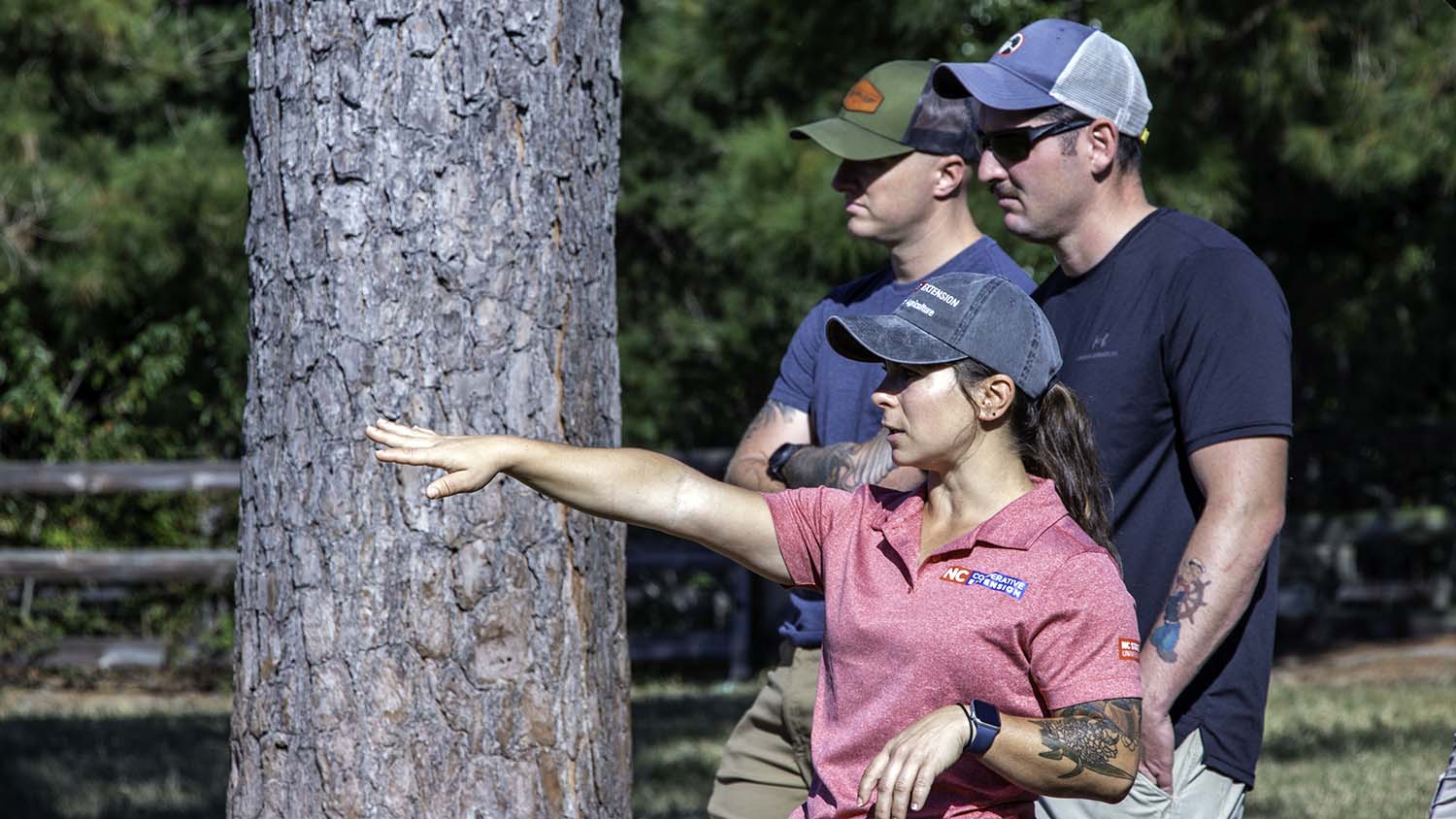
NC State Extension area livestock agent Liz Joseph conducts a training session for U.S. Army Civil Affairs Soldiers at a farm in Hoke County.
Civil Affairs Soldiers represent their nation as essentially cultural ambassadors. They help local populations by reducing the causes of instability. The mission includes hands-on assistance, diplomacy, and problem-solving.
“Their jobs are actually very similar to Extension experts where they make connections and connect the local population with government programs and just help in general,” Joseph said. “I don’t just talk to them about the agriculture side. It’s also the importance of being able to create, build and maintain relationships.”
Related: NC State Alliance Aims to Grow African Agriculture
The soldiers are part of U.S. Army Special Operations. They apply for the program and must meet rigorous qualification standards, including fluency in a second language. Training at the Civil Affairs School at Fort Liberty includes courses in government, diplomacy, and survival. They are diplomat-warriors.
“The value proposition for Civil Affairs is that we can be both,” said Haverlah, who has deployed to Yemen and Egypt. “We can be cultural experts. We can focus on foreign policy; we work with the State Department a lot of times. But we’re still in the Army. We can do tactical things. A lot of what we’re doing could be done by another NGO [non-governmental organization]. It could be done by the State Department. The thing that Civil Affairs brings to the table is that we’re doing it in areas that those civilian counterparts can’t get to.”
According to the Army, they are “tactical, physically fit, highly trained, and bring a specific expertise to every mission.” After learning from Extension experts and farmers in North Carolina, that expertise includes helping with agriculture.
“The first week we go out to farms so they can learn,” Joseph said. “The second week we throw them into scenarios where they are applying their newly acquired agriculture knowledge in a real-world experience.”
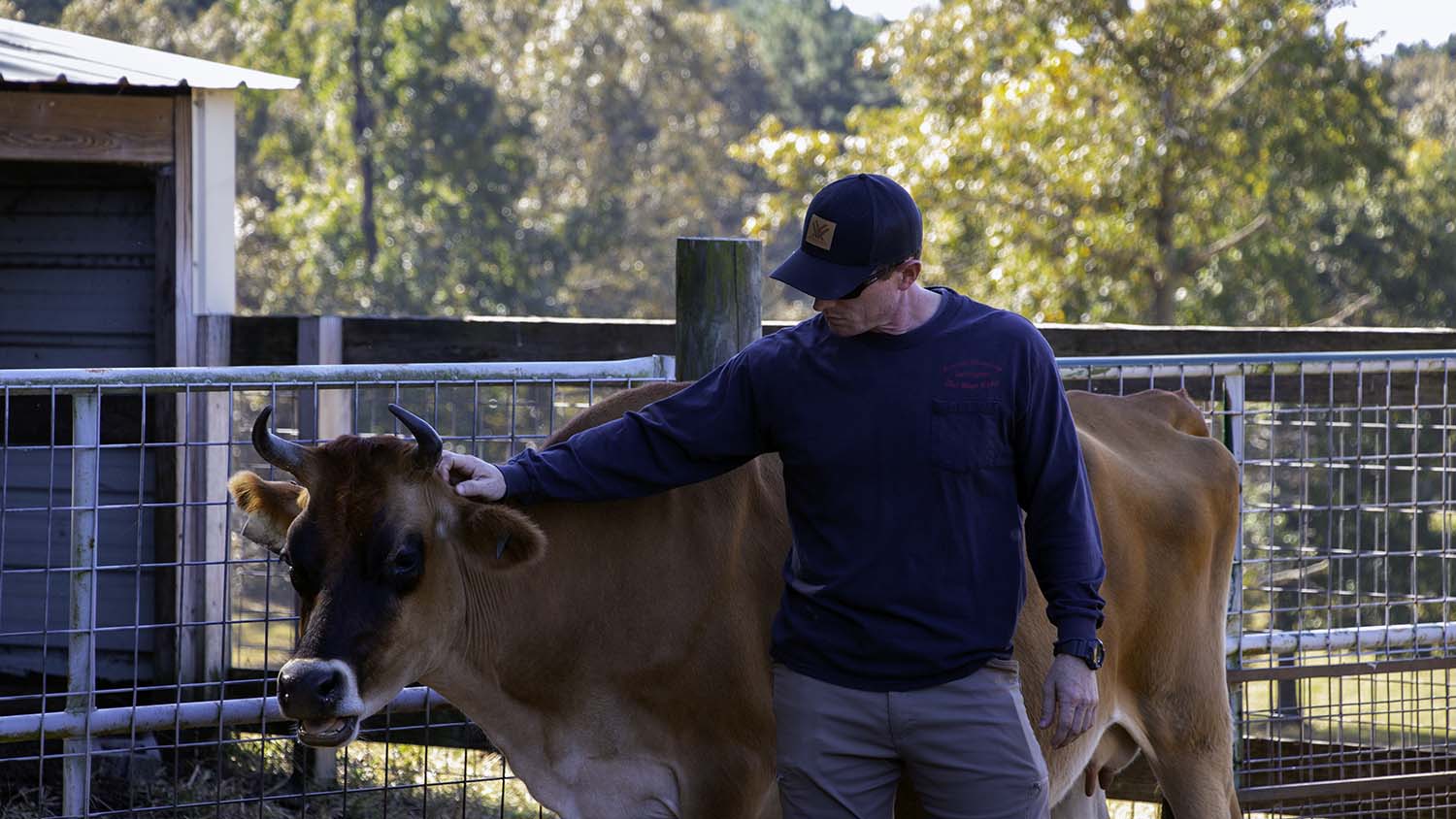
A Civil Affairs Soldier gets up close and personal with a dairy cow at Ithika Acres farm. NC State Extension partners with farms in Cumberland, Hoke, Moore and Robeson counties to conduct the training program.
During a training in late October, the soldiers learned about produce; beef and dairy cattle; caring for small ruminants, including hands-on hoof trimming; and poultry processing and safety — how to dispatch the animal humanely, and how to handle the meat.
The Civil Affairs Soldiers volunteer to take part in the program. Staff Sgt. Cameron Cammelleri opted in because he saw the value of agriculture knowledge during deployments to Syria and Somalia.
“A lot of the countries that we go into rely on small ruminant animals and agriculture,” he said. “We’re that middle man and we can speak between the civilian population and military population.”
Two weeks is not enough to become an expert, but the soldiers acquire a base knowledge that helps in their overseas role.
“They absorb more than I expect,” Joseph said. “I think it’s because we’re actually on the farm talking to farmers and they get hands-on. They’re really good at taking notes too. And they’re eager to be here, which also helps retain the knowledge.”
Joseph and other Extension experts remain available after the training.
“Oftentimes they’ll reach out with a question about livestock or agriculture when they are overseas,” said Lisa Childers, director of the Extension center in Cumberland County. “So it doesn’t stop even though they finish the course. We continue to serve as a resource for them once they deploy.”
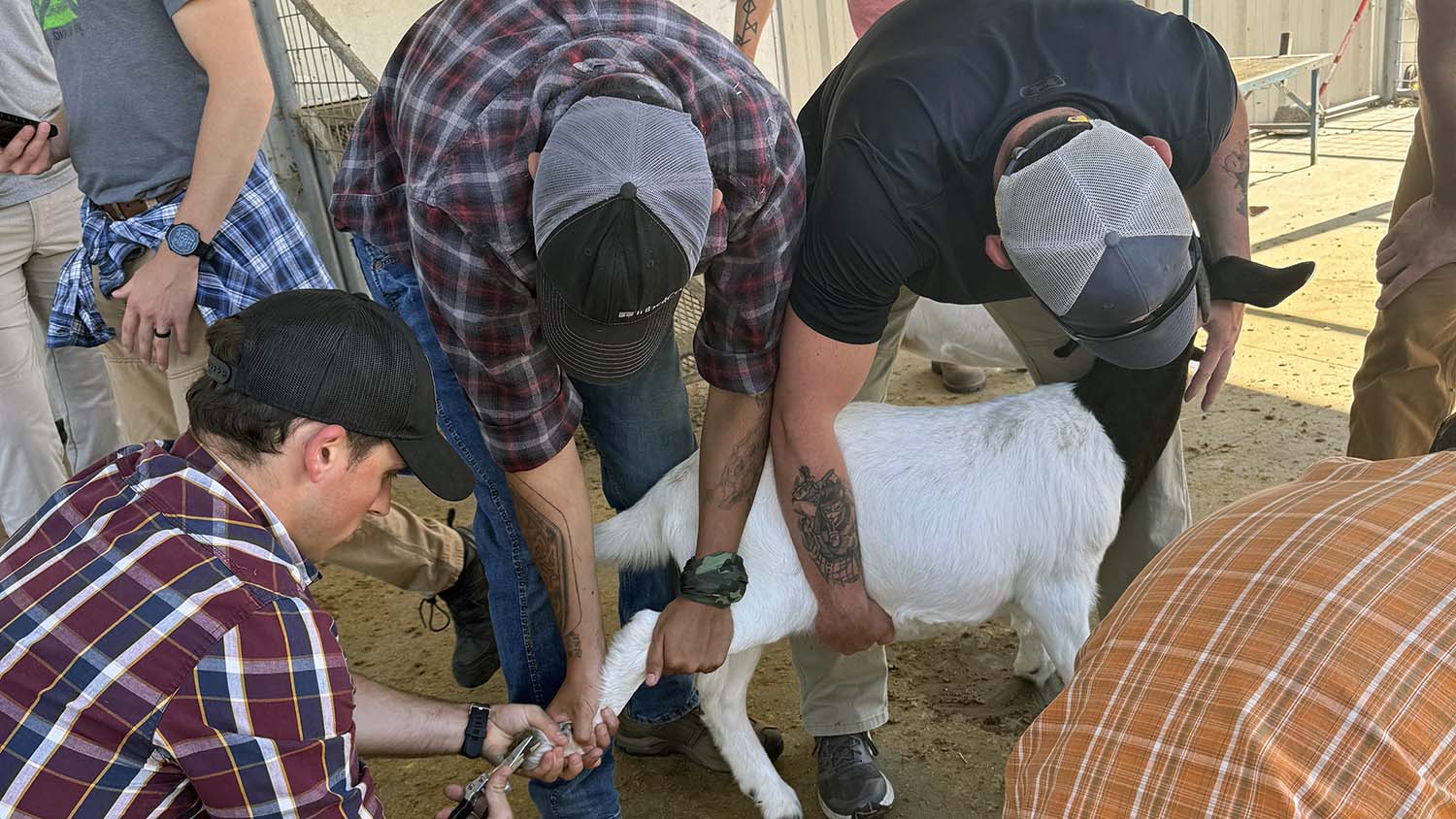
Soldiers learn how to trim a goat’s hooves. Small ruminants are prevalent in countries where the soldiers will deploy.
Joseph has heard from teams that were able to apply their training in agriculture.
“We had talked about goat dairies and milking goats, and a person was able to gain the trust of a farm and help that farm,” she said. “There was another team that got deployed to Panama. They had this knowledge fresh in their brain, and they used it to help small ruminant producers. They were able to see the farms and map the area and gather the information that they needed. So the knowledge that they’re learning here is being applied.”
The training takes place on farms in Cumberland, Hoke, Moore and Robeson counties. Farmers volunteer their land, their time and their expertise to help the soldiers learn about agriculture.
“Without the farms this training would not be possible,” Joseph said. “They are so giving with their time and knowledge. The farmers really do look forward to this. They say, ‘Tell me when the next one is so I can make sure I’m available.’”
Some of the training in late October took place at Ithika Acres in Hoke County, a family-owned farm with goats, beef and dairy cattle, lambs, chickens, blueberries and peaches.
“We just love the program,” said Stephanie Carter, daughter of farm owners John and Allison Carter and manager of the creamery. “We do this completely voluntarily. We see it as a blessing to share with them what we do every day of our lives.”
Stephanie Carter helped Joseph teach the soldiers the difference between beef and dairy cattle (dairy cattle put most of their energy into producing milk instead of building muscle and fat, so if they appear skinny it’s not because they are malnourished) and talked about farm economics. Allison Carter spoke about small ruminant nutrition and managing honey bees.
Joseph and Tom Shea, a former Extension livestock agent in Moore County who remains involved as education and outreach coordinator for the National Grazing Lands Coalition, showed how to trim goat hooves.
“They can take this and say, ‘Oh, this cow is in good condition.’ Or, ‘This is how we hoof trim.’ They can use the information that we give them to have a foundation to talk to the farmers in other countries and start building a relationship,” Stephanie Carter said.
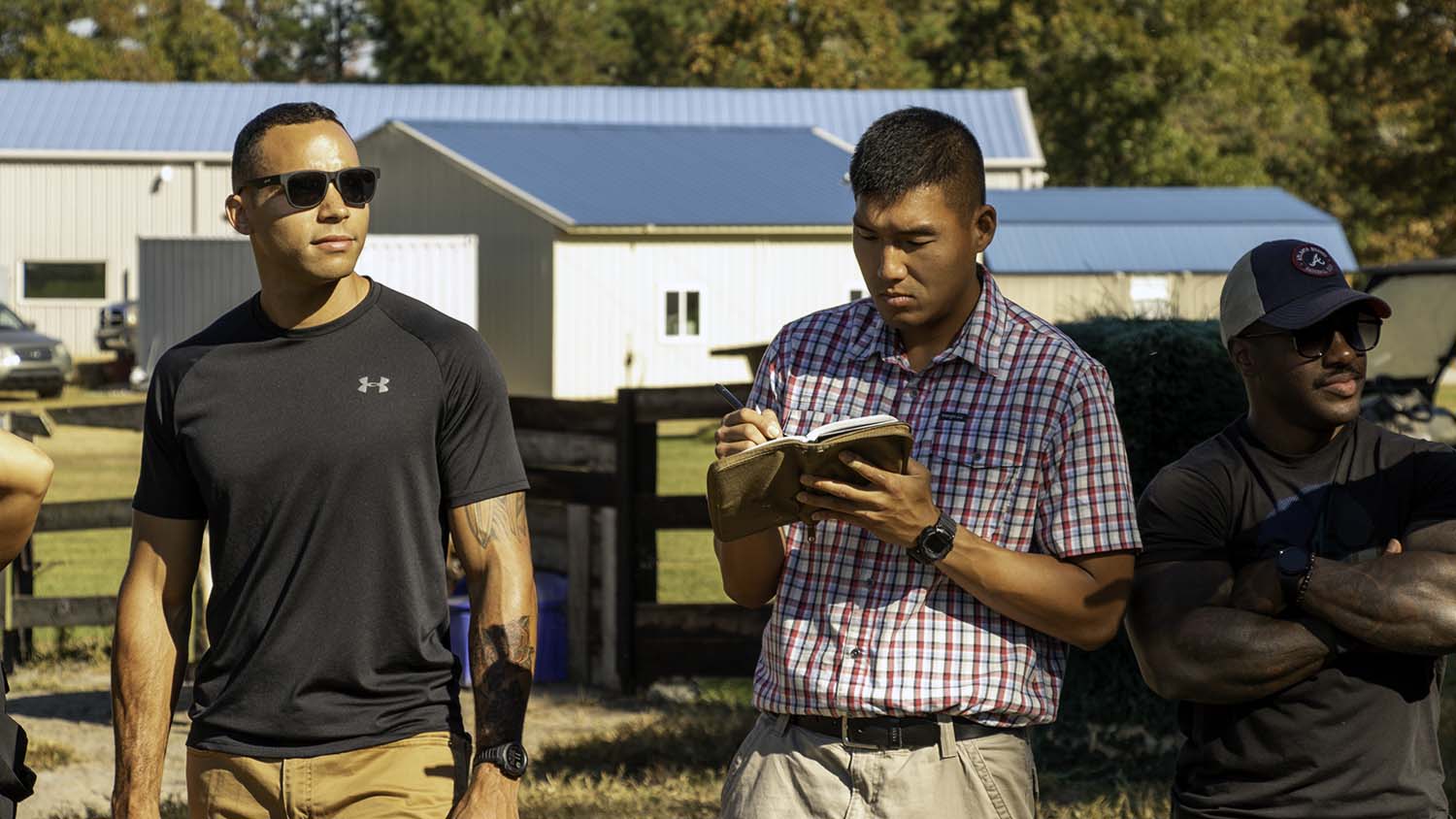
Note-taking helps Civil Affairs Soldiers like Staff Sgt. Brian Jeon recall the information from the two-week course. Extension experts remain available to answer questions after the soldiers deploy.
The program began in 2010 when the military reached out to Childers and asked if somebody could talk to soldiers about agriculture.
“I thought, ‘Wow, this is an opportunity for Extension to be able to give back to an industry that keeps us safe and does so much for us,’” Childers said.
The first class met at the Extension office in Fayetteville. The next one combined classroom training in the morning with an afternoon farm visit. When Joseph was hired in 2014, she expanded it to one week and then to the current two-week training that takes place as many as three times a year.
“Liz has done a great job with it,” Childers said. “We’ve enjoyed watching the program grow and develop. You think about the impact of agriculture here locally, but when you think about it on the global scale, that’s even more impressive. And then you think about global security, which is another aspect of it. It’s really a great feeling.”
The overseas impacts are the primary purpose of the program, but there are additional benefits in North Carolina and beyond. For one, it serves to educate people about NC State Extension and what it does for the people of the state.
“On the first day I always do a presentation on what Extension is, and then they tell people, and they tell people,” Joseph said. “So it’s a good way to promote Extension.”
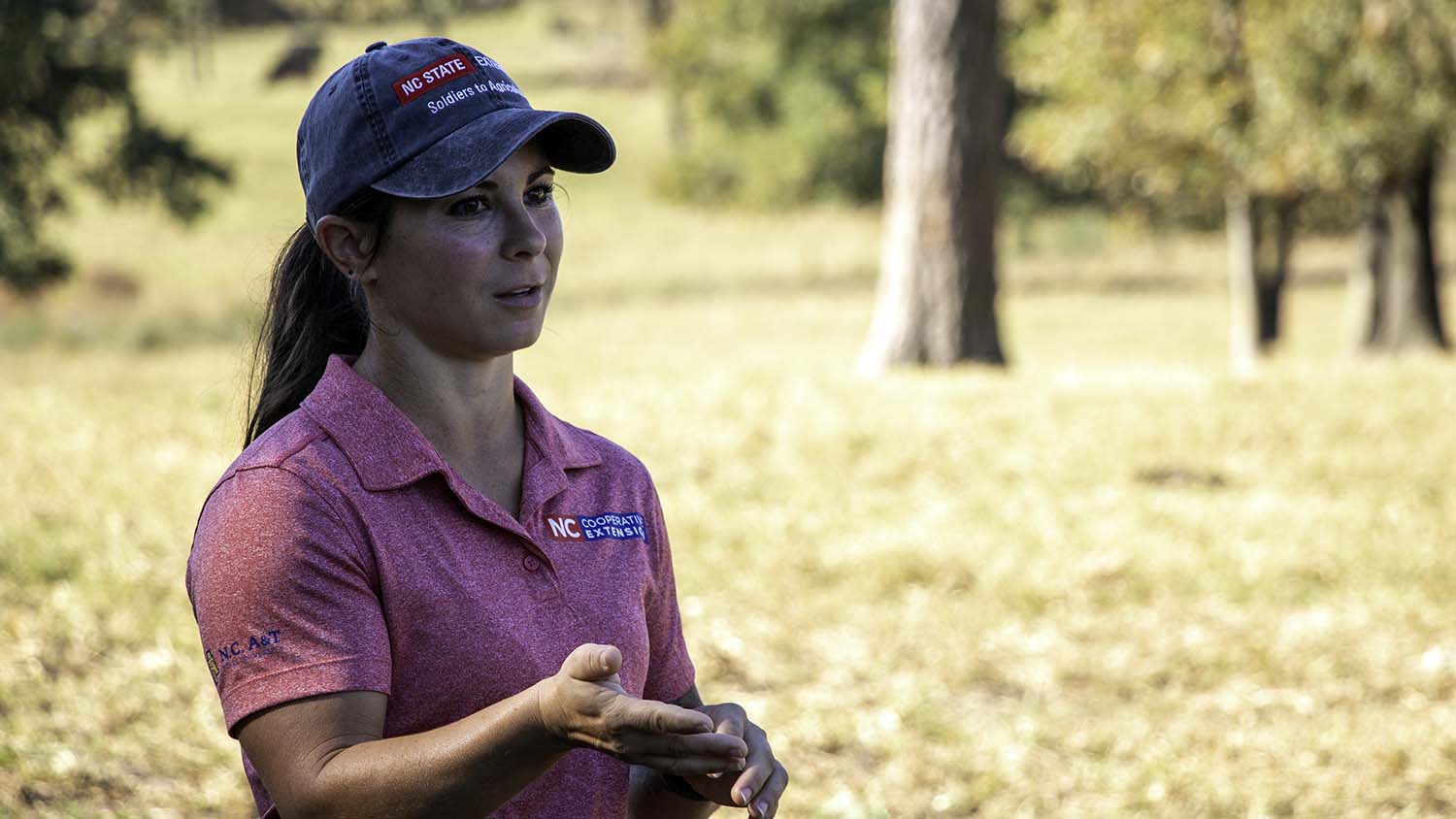
Liz Joseph, Extension area livestock agent for Cumberland and Hoke counties, is grateful for the opportunity to help the military.
In at least one instance, the program could have a nationwide impact.
“I’m working with a special forces soldier in California who was a farmer in Moore County,” Shea said. “He is doing a master’s project based on information that Liz gave them during the training. He is working on changing Department of Defense policy for grazing on military installations. He said the things that he learned really resonated with him and he is now leading a national effort that started with this program.”
Related: NC State Apprenticeship Programs Introduce Veterans to Farming
Veterans Day is celebrated on Nov. 11. It’s a time to honor military members for their service to their country, and reflect on their sacrifice.
As someone living near one of the largest military installations in the world, Joseph appreciates the role of the armed forces. As an Extension agent, she is grateful for the opportunity to help train them for their mission.
“This training is a lot of fun and I’ve been really lucky to be a part of it for so long,” she said. “I would start to cry if I really think about it because I really do feel so lucky that I get to have an impact and help the military. They do so much for us, keeping us safe, and it’s really nice to be able to give back to them.”

